Kungkas Can Cook is a café, catering and bush foods business based in Alice Springs, specialising in ethically sourced, organic bush food from the Central Desert.
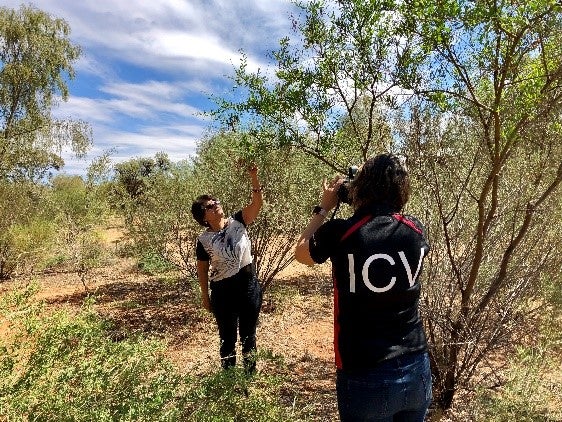
Kungkas Can Cook, Rayleen Brown with ICV volunteer Deborah Stanley, gathering content for the new website.
Kungkas Can Cook has a strong social purpose and promotes foods that have been enjoyed by Aboriginal communities for over 40,000 years. Kungkas Can Cook have shortened the supply chain so that local women harvesters benefit from every purchase.
For more information on the journey of Kungkas Can Cook, and the social purpose of the business, visit: https://kungkascancook.com.au/first-farmers
In the first half of 2019, Kungkas Can Cook (further referred to as ‘Kungkas’) worked with Indigenous Community Volunteers (ICV) on two community development projects: (1) to increase efficiency of financial processes; and, (2) to develop an e-commerce website that reflects the voice and social purpose of the business.
The monitoring and evaluation (M&E) process ICV and Kungkas used as part of these projects is outlined below. Firstly, the approach and community benefits of the approach are discussed, secondly, the findings and the benefits of how they were applied.
How was the evaluation conducted? How did the evaluation approach benefit the community?
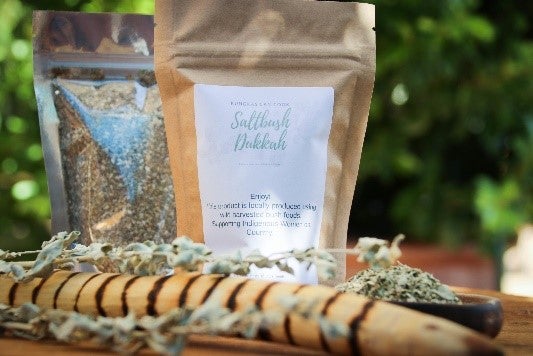
As part of the project, the ICV volunteer and Rayleen worked together to take photos for the e-commerce store, training in photography for future product cataloguing.
The monitoring and evaluation (M&E) operated within ICV’s community development cycle of (1) shared understanding (2) engage and empower (3) connect and build (4) design and deliver and (5) reflect and celebrate. The practical application of this approach while working alongside Kungkas is outlined below.
1. Shared understanding
To begin with, ICV spent time getting to know the founder and team at Kungkas. Informal discussions were used to recognise and identify strengths, values, passions, long-term aspirations and barriers that Kungkas wanted to overcome. ICV only engages with community members on any of their projects or evaluation of projects when invited by them. Following this initial engagement, Kungkas invited ICV to work with them.
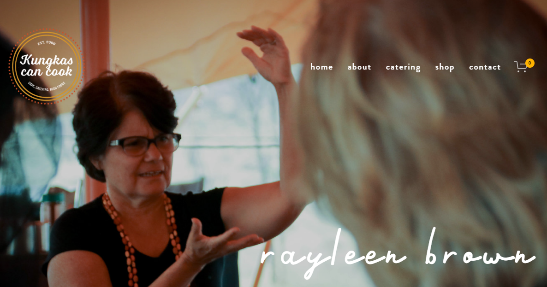
A screen shot of the Kungkas Can Cook website developed with ICV.
Engagement built a strong relationship and understanding between ICV and Kungkas about what both organisations do and how they work. This provided an opportunity to determine whether it was a good fit to work together or whether other providers / services might be more suitable. In the end it was Kungkas’s decision whether or not to work with ICV.
“Working with ICV, it’s a really different experience to working with other support services for people in small business or Indigenous business. Usually, you have to work within their frameworks and their way of working. But with ICV you have more of a chance to model things the way you want, or to move at the pace you want to work. Whether it’s fast or slow, it seems that ICV can do both”.
—Rayleen Brown, Kungkas Can Cook founder
ICV worked respectfully, using a strengths-based approach. For example, ICV identified that the founder, Rayleen, is a strong business woman, an inspiring presenter, has a wealth of knowledge of the bushfoods industry nationally and across communities in the central desert, has strong networks nationally and with many remote communities and has a great reputation in Alice Springs where she operates her café. These strengths were the focal point of discussions. Kungkas found this approach affirming and encouraging. It built trust.
“[When working with ICV] you can be open in what you’re saying, and be open in the direction you want to go in. And, by working together to decide on the goals for the project, it made me realise that we’re not starting from the start, that I had already done a lot of the work, but just needed some support to get to that next level.”
—Rayleen Brown, Kungkas Can Cook founder
Early engagement was also used to identify the short and long-term aspirations of Kungkas. The dream is connected to the passion and drive of Kungkas and it is the ‘fuel’ that keeps the founder and team going.
2. Engage and empower
Engagement continued through yarning and transect walking around the café premises and surrounds pointing out key elements of the business and areas of growth. This provided an informal and relational introduction to aspects of the business, products and significance of different bush foods. These findings were recorded as observations. The projects and dream create a purposeful reason for ICV’s continued engagement with Kungkas, and Kungkas identified how ICV support could benefit their organisation and the communities they work with. The evaluation was co-designed together with the project. As well as the benefits of a practical project that would deliver results, ICV explained how M&E would be conducted throughout, and the benefits of incorporating M&E into the project: keeping the project on track and adjusting the approach based on what was found through doing the M&E work. The M&E plan included two data collection points: one at the beginning of the projects and one at the end.
ICV provided expertise on community and business development and Kungkas provided expertise on the intricacies of the communities they work with, their business and their customer base. An important part of the design process was to understand the short and long-term aspirations of Kungkas and ensure that each project would be connected and build toward the long-term dream. Based on informal conversations on Kungkas priorities, a set of project objectives and short term (project) indicators and long term (dream) indicators were co-developed. A ‘seed to tree’ scale was used to collect a baseline (quantitative) and a brief comment (qualitative) for each indicator.
The project co-design process was used to ensure that the projects aligned with the priorities of the community. Objectives acted as clear goal posts for what Kungkas wanted to achieve. Indicators recorded what Kungkas wanted to see change. These formed the project plans for the two projects.
“I find that really great, that process that you are taking me through, step by step. It’s not been that you guys are lifting me up, but you’re walking beside me. That’s how I feel it is, it’s a walk beside thing.”
—Rayleen Brown, Kungkas Can Cook founder
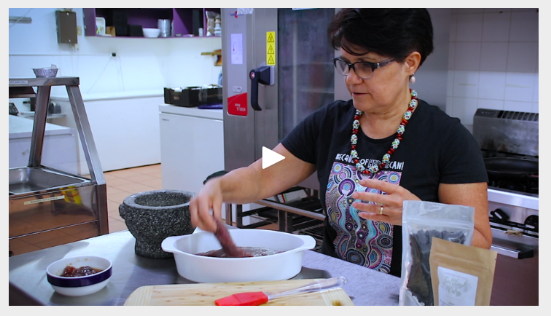
Video blogs were developed with the ICV volunteer, training in videography and communications was included as part of the project.
3. Connect and build
The project plan was used to connect to the most suitable volunteers for each of the projects. Kungkas decided which volunteer to work with by reviewing volunteers’ CVs, connecting over the phone for an informal interview and discussing recommendations with ICV.
The project and M&E plan fast-tracked the volunteers’ engagement with Kungkas – the volunteers arrived on the scene knowing Kungkas’ priorities.
“Getting to speak to Deb [the volunteer] over skype, and see her face was great! It feft like I already knew her and that she was part of the Kungkas family. I trusted her and that she would be the right person to work with us.”
—Rayleen Brown, Kungkas Can Cook founder
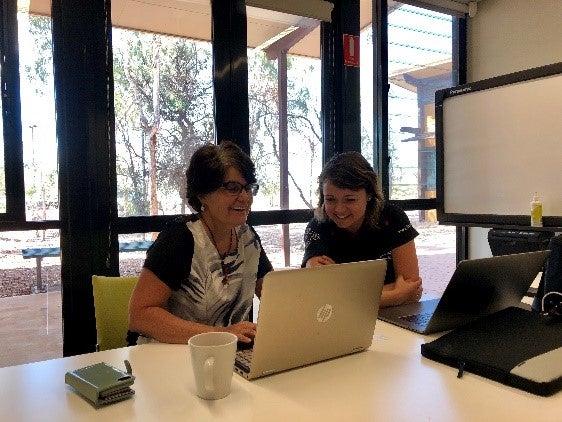
Rayleen from Kungkas Can Cook and ICV Volunteer, Deb, worked closely together to develop the content for the website to ensure the content was in Rayleen's words - that it was her story.
4. Design and deliver
Delivery of the projects was centred on the objectives and indicators. The volunteers stuck to the project brief. The high level project plan created the scaffolding for finer design of the project using the volunteers’ industry expertise. In the case of the accounting project, the volunteer provided advice and guidance on how to design Kungkas’ accounting system for maximum efficiencies. In the case of the website, the volunteer provided advice on website structure, curation and development of copy to optimise communication and marketing.
Volunteers leveraged off the engagement and understanding ICV gained through the early phases of the project. This saved Kungkas time and energy. The detailed understanding ICV had gained allowed the volunteers to work respectfully and sensitively, using a strengths-based approach while targeting support to the area identified by Kungkas.
“When I showed Rayleen the draft project plan based on our conversations, her eyes just lit up with surprise and relief, and she said how rarely people really listen to try to deeply understand her and her business. She was really glad our volunteer Roy would have this information, as she often felt like she had to repeat herself over and over for other support services.”
—Maddi Ginnivan, ICV Community Development Officer
Working to a co-designed project and M&E plan provided transparency and accountability to Kungkas: ICV and the volunteers knew their contribution would be assessed against the Key Performance Indicators (KPIs) that the community had identified and designed.
“It’s like a step by step process, and you get to look at each step that you are taking. It’s like you’re growing, and growing, and then all of a sudden you’re there!”
“I was a tree with a little branch. I felt like I knew a bit about it [the finances], but now I understand a lot more about what needs to be done. I wasn’t confident at the start, but I am now and it’s prompted me to do this work. I feel a lot better now, I feel like I’ve grown a few more branches!”
—Rayleen Brown, Kungkas Can Cook founder
5. Reflect and celebrate
In the final stage of the M&E work for each of the projects, monitoring data was collected using the ‘seed to tree’ scale for the project indicators. A quantitative rating was captured and alongside that, an adaptation of the ‘most significant change’ and ‘appreciative inquiry’ techniques were used to gather qualitative data through semi-structured interviews with community members. Other data collected included observations of the ICV Community Development Officer, who was conducting the evaluation and who managed the project, and assessments from Kungkas and the volunteers.
Having two monitoring points for the projects (start and end) enabled a clear comparison and highlighted what had changed in the project (see more details below). This was a source of encouragement and an intentional approach to celebrating the wins. Areas for future improvement were also identified (see more details below).
Providing the three perspectives as part of an internal assessment allowed for triangulation while still operating within the scope of the project and within the approach agreed with Kungkas.
At the end of each project, the Kungkas’ dream was revisited, and the dream indicators assessed to see which indicators progressed and which required renewed attention. These findings inform future project design and aid the Community Development Officers and communities to prioritise the focus of the next project.
“Rayleen and I have found that mapping out her long term goals on a big timeline works really well at the end of each project, as it helps her to work backwards and make decisions about what the next priority is”
—Maddi Ginnivan, ICV Community Development Officer
What were the key findings? What changes happened as a result?
At the end of the project, significant progress was noted against Rayleen’s project indicators for financial literacy, self-efficacy regarding communicating with the financial sector, and knowledge of tax accounting processes. Rayleen felt confident to tackle the tasks at hand, and was clear on what work needed to be done from there on out. A six-month post project assessment further showed that the project resulted in Rayleen having the knowledge and confidence to ensure she is receiving a higher quality of service from the financial services her business contracts, as well as receiving financial support from other sources based on the action plans identified during the project.
The ongoing discussions and capacity strengthening between Rayleen and the volunteer throughout the project organically identified areas of further growth, and there was opportunity for this to be addressed in the final assessment by the community. Rayleen identified a new goal of wanting to increase Kungkas use of budgeting and financial reporting. As a result, ICV is working with the same volunteer to develop a new project in the coming months, thus utilising an Action Research methodology of continued learning, implementing, evaluating and adjusting in partnership with the community.
Similarly, the assessment of the Kungkas Can Cook Website project showed an average 80% increase achieved against Rayleen’s three project indicators. These included the quality and quantity of content on the website, the functionality and integration of the e-commerce store into their operational processes, and their team’s digital literacy. The volunteer worked with Rayleen to identify a plan for continued learning to achieve the remaining project goals, and Rayleen identified another new project focusing on digital marketing which will be completed later this year.
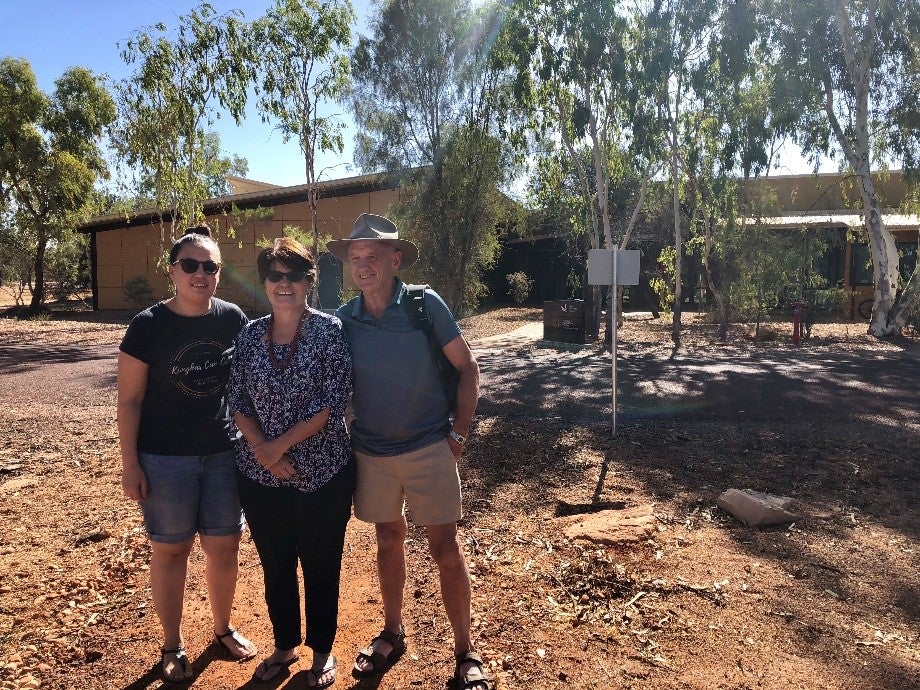
Kungkas Can Cook team, Rayleen Brown and Cherie Reid, set for a day of financial planning at the Desert Knowledge Institute with the ICV Volunteer Roy Davenport.
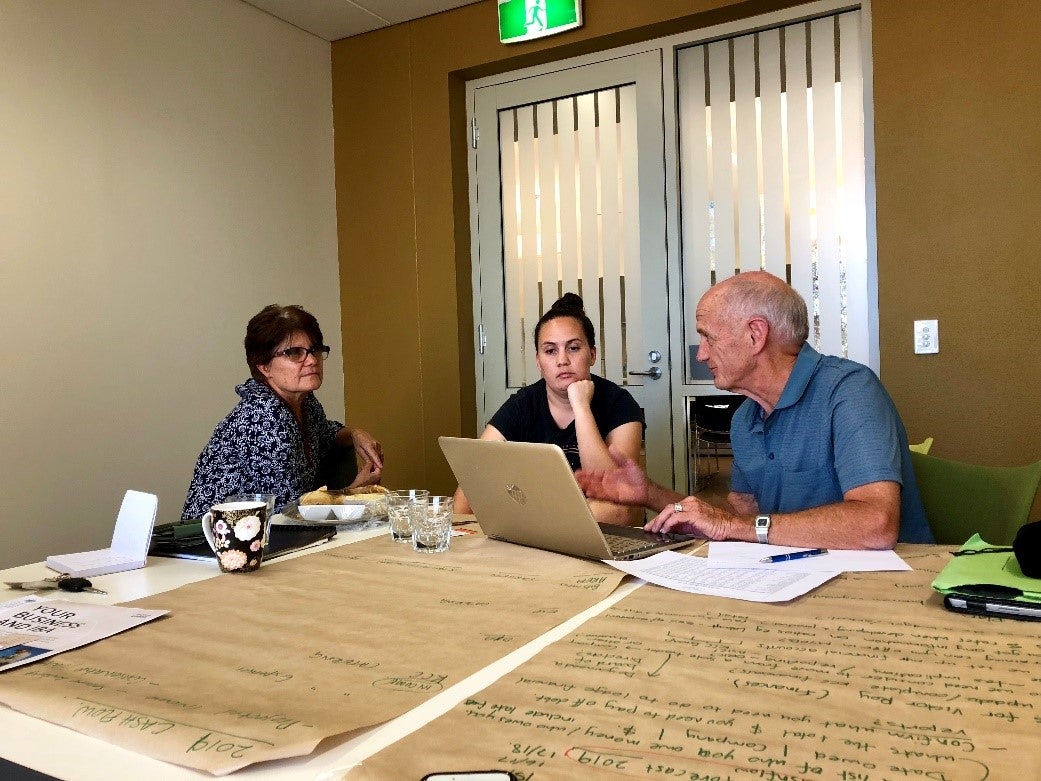
Financial planning in action with the Kungkas Can Cook team, Rayleen Brown and Cherie Reid, with ICV Volunteer Roy Davenport.
How were ethical principles put into practice?
Referring back to the Ethical Protocol, we describe how the M&E work with Kungkas put the principles into practice.
|
Prioritise self-determination, community agency and self-governance |
||
|
Principle |
Application of principle |
|
|
Empowerment |
Aboriginal and Torres Strait Islander peoples have the right to self-determination and to be encouraged and empowered in decision-making processes. Evaluators must listen and advise to the benefit of communities above all else. |
This project worked with ICV’s community development cycle (that incorporates M&E): strong relationships, engagement and shared understanding came first, before any M&E activities started. ICV was invited to work with Kungkas Can Cook (further referred to as ‘Kungkas’) after ICV spent time explaining how they would work with them, the benefits of ICV projects and how M&E would be used throughout. Kungkas co-designed the project and M&E activities by prioritising the objectives and indicators for the project. Kungkas was provided with a visual illustration and report of quantitative ratings using a “seed to tree” scale. Kungkas was involved in a reflective session at the end of the project that informed the selection and design of the next project to be undertaken. Capability strengthening that was meaningful to, and requested by, Kungkas was built into the project: financial, website, photography and copy writing skills. In addition, M&E techniques using video, audio and photography were incorporated – skills that can be used within the organisation. |
|
Diversity |
Recognise the diversity and uniqueness of First Nations Cultures, Peoples and Individuals. |
Time was taken at the outset to understand Kungkas and its context. Situated in Alice Springs, and connected to many different remote communities, Kungkas is a careful and respectful custodian of many First Nations communities’ bushfoods practices. The evaluator and volunteers followed Kungkas lead and instruction on how to manage these relationships and connections to multiple First Nations cultures. |
|
Inclusion
|
Involve Aboriginal and or Torres Strait Islander people in all levels of the evaluation, from design phase right through to analysis and communicating findings. |
Informal yarning was used throughout the co-design and delivery of the project. In addition, Kungkas knew there would be assessment points at the start and end of the project. A participatory approach of transect walking was highly suited as an M&E approach . To ‘walk and talk’ about the organisation while viewing the site of the business, products and significance of different bush foods. |
|
Facilitate control and data sovereignty |
||
|
Principle |
Application of principle |
|
|
Community ownership |
Evaluation, and the knowledge created through evaluation, is owned by the community. |
Kungkas was provided with a project and M&E plan and all of the audio and video recordings about the project and assessments. |
|
Respect |
Respect the custodianship of Aboriginal and Torres Strait Islander peoples and cultures, their ongoing and unbroken connection to their land and water and the right to protect, maintain, control and benefit from their Aboriginal and or Torres Strait Islander Cultural Intellectual Property (ICIP). |
The evaluator and volunteer developing the website were acutely aware that sensitive Indigenous Cultural Intellectual Property was discussed regularly. This was managed by frequently asking about any protocols or sensitivities in how information from different cultures was managed and shared with others. |
|
Interpretation of culture |
Aboriginal and Torres Strait Islander peoples have the right to determine and approve the interpretation of their culture as the primary guardians and interpreters of their cultural heritage. |
The interpretation of cultures was an important part of this project as the harvesting and use of bushfoods was discussed at length. Care was taken to ensure this was done first-hand by Kungkas using audio recordings and transcripts to ensure accuracy. Permission was and will continue to be requested before cultural information is shared. |
|
Integrity and authenticity of culture and knowledge |
Aboriginal and Torres Strait Islander peoples have the right to maintain the integrity of their ICIP. |
Kungkas were clear from the outset that they are the owners of the information collected throughout the project. ICV’s volunteer agreement signed before every project ensures that the volunteer is aware that any work produced throughout the project remains the IP rights of the communities they are working with. |
|
Secrecy and confidentiality |
Aboriginal and Torres Strait Islander peoples have the right to keep secret their sacred and ritual knowledge in accordance with their customary laws. |
The volunteer was informed of instances where cultural knowledge related to bush food was commercialised, and the negative impact this had was made known. Through the website project, the volunteer worked with Rayleen to filter the stories for information that was better to be left out of the public sphere. |
|
Communicate transparently, build trust and obtain individual and community consent |
||
|
Principle |
Application of principle |
|
|
Consent |
Obtain the free prior informed consent of Aboriginal and or Torres Strait Islander people before commencing the evaluation. |
Before starting the project, a project agreement outlining the project and M&E approach was discussed and signed. Importantly, Kungkas invited ICV to work with them. An ICV Community Development Officer (CDO) acted as a key point of contact throughout the M&E activities and Kungkas knew they could raise any concerns with the CDO at any time during or after the assessments. Rayleen was asked permission before any information was recorded for M&E purposes. Consent forms were used for photo, video and audio recordings. |
|
Equity |
Evaluation must be transparent, equitable and respect the integrity of the community. |
Kungkas was an equal partner in the design of the M&E approach and the project. Ample time was built into the timelines for engagement and discussion. Insights about the project shared by Raylene that may affect her relationship with other parties beyond ICV were always kept confidential or removed from reports at the request of Raylene. |
|
Strength-based recognition of cultures, acknowledging communities and individuals |
||
|
Principle |
Application of principle |
|
|
Attribution |
Aboriginal and Torres Strait Islander peoples and communities have the right to choose to be acknowledged and attributed for their contributions to an evaluation. |
All proposed publication of work related to the M&E activities has and will be shared with Kungkas for comment and approval and to confirm appropriate attribution. In particular, this is an important benefit for Kungkas – to promote their business and passion to see traditional, ethical bush harvesters supported and compensated appropriately for their work. |
|
Strengths-based |
Affirm and celebrate culture. Take a strength based approach and build from cultural strengths. |
ICV identified that the founder of Kungkas, Rayleen, is a strong business woman, an inspiring presenter, has a wealth of knowledge of the bushfoods industry nationally and across communities in the central desert, has strong networks nationally and with many remote communities, and, has a great reputation in Alice Springs where she operates her café. These strengths framed discussions, while still targeting areas of growth and improvement for Kungkas.
|
|
Advancement of culture |
Aboriginal and Torres Strait Islander cultures are not static and Aboriginal and Torres Strait Islander peoples have the right to protect, maintain, revitalise and advance their cultures. |
The evaluator undertook ICV’s cultural induction and has been informally mentored by a senior Aboriginal woman from the Central Desert within her workplace. To respect the cultural practices of Kungkas, engagement and relationship building was invested in before the projects and any assessments commenced. Where the evaluator was unsure about cultural protocols -at any point during M&E activities, she would ask first. Many of the cultural aspects of the project are now promoted on the Kungkas website, in their words and in their preferred format. |
|
Participation |
Aboriginal and Torres Strait Islander peoples are evaluators and should be regarded as equal partners. |
By building M&E into the delivery of the projects, Kungkas took a key role in providing expertise on their organisation and designing the projects. Formal monitoring points at start and end of the projects were useful points of reflection. However, ongoing discussion throughout project delivery was key. In particular, understanding the big picture and long-term vision of Kungkas. The evaluator mapped out key priorities with Kungkas, the amount of time the priorities/projects would take and worked on sequencing these with Kungkas. Slowing down to listen was an important part of this process. Kungkas had already learned many lessons and was able to apply these and guide the discussion based on past experiences unique to the organisation. |
|
Share benefits and apply two-way learning |
||
|
Principle |
Application of principle |
|
|
Community transformation |
Aboriginal and Torres Strait Islander peoples involved in, or affected by, evaluation should benefit from the evaluation project and not be disadvantaged by it. |
M&E findings were provided to Kungkas in written form. However, discussing and reflecting on the findings was a more valuable and beneficial approach. These reflective discussions throughout and at the end of the projects informed the next steps and direction for Kungkas. For example: Kungkas’ next project will be to develop a business/strategic plan capitalising on capability and systems now developed in finance and marketing. |
|
Community priorities |
Evaluation must reflect the priorities of the community. |
All assessments were based on community priorities. Short term (project) indicators and long-term (dream) indicators were co-developed. |
|
Build capacity |
Evaluation must build capacity and capability for decision making and voluntary actions of participants and the communities in which they live. |
Capacity strengthening was built into the M&E approach, specifically relating to skills relevant to the community. Taking a participatory action research approach allowed for the delivery of practical products (financial system and website) while developing skills to use these beyond the involvement of ICV. |
|
Share results |
Evaluation results must be presented and available to communities in a form that is translatable to community needs.
|
The use of photos and audio, video and transcription services allowed for the translation of results into a format that benefited Kungkas. A financial system and a website that was tailored to the unique needs of Kungkas was developed. The M&E findings (formal and informal sessions) were also used to undertake a planning session to prioritise and sequence future projects. |
|
Formalise accountability processes on ethical practice |
||
|
Principle |
Application of principle |
|
|
Accountability |
Include appropriate mechanisms and procedures for reporting on ethical aspects of the research and complying with this ethical framework. |
Formalising the relationship and M&E approach was done through a project agreement. Consent forms were used for photo, video and audio recordings. |
A special thanks to this page’s contributors
Rayleen Brown, Founder and Owner, Kungkas Can Cook; Maddi Ginnivan, in her role as an internal evaluator and Community Development Officer, ICV; Belinda Gibb and Sharon Babyack, ICV.
Related content
This is part of a series
These are good practice examples of evaluation and participatory monitoring of Kungkas Can Cook. These examples are part of a bigger project which seeks to share examples of good evaluative practice from communities across Australia.
'Evaluating with Kungkas Can Cook: passion, dedication and clear social purpose' is referenced in:
Framework/Guide
- Evaluation practice in Aboriginal and Torres Strait Islander settings :
Resource